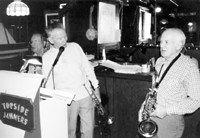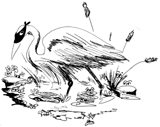
Dock of the Bay

Volume VII Number 21
May 27 - June 2,1999
On the Town: The Topside Jammers
photo by Mark Burns The Topside Jammers playing at work.
Amid the rustic decor at The Topside Inn hangs a hand-painted
sign reading "Dixieland Every Sunday 5:30-9:30." During
those hours, the restaurant undergoes metamorphosis, as floods of big band
sound bring New Orleans to Galesville. Since March 1979, The Topside Jammers
have performed this transformation, setting up their instruments and a red/white
podium to create an almost animate force: live music. Dixieland defines
the category of upbeat, classic jazz that dominates their repertoire, intermingled
with waltz, polka, Latin, nostalgic and classical.
Five musicians play each week, but about 20 musicians have jammed with the band over the years.
Among the original members, Dick Sowell, 77, contributes his talent with the trumpet. Born in the Bronx, Sowell took up the instrument at age 17, was educated at the prestigious Peabody Conservatory of Music and The Navy School of Music, then played with The Navy Band for 26 years. He has the most formal education of this band with many experiences.
Sowell's electrifying style emanates in person as his face lights crimson and gray hair reaches with the notes. In such rapture, he resembles a boy of seven holding his breath rather than a man age 77 with plenty of experience controlling his breath. "I just enjoy playing - and playing what pleases the people," he claims.
Topside's trumpeter names Warren Vaché as a musical influence and "You Know What It Means To Miss New Orleans" as his favorite piece.
Another who has traveled Galesville Road over a thousand times with his horn, Tony Caporale, 76, provides the trombone part. Self-taught, he has been playing 40 years, and his experience shows.
Amiable and unassuming, he fits in the corner to slide the arm of his
trombone along an aquarium, making Chinese goldfish dance like Creoles.
One of his favorite pieces, "Unforgettable," sounds like pure
instrumental silk when performed by these gentlemen. Caporale likes being
a jammer, he says, "Because it's fun and keeps me young."
A large smoky mirror hangs with a strip of white bulb lights behind the keyboard position, complementing the smoky, white visage of both tall musicians who appear there. Recently resigned keyboardist Walter Marquardt, 72, still makes appearances with the band. Marquardt began piano lessons at age 12, taught music and played with The Jammers for about four years. "It's fun because the guys are all nice and good musicians," Marquardt says.
photo by Mark Burns Trombonist Tony Caporale, trumpeter Dick Sowell and saxophonist David Kaseman rest after a jam.
Currently working the keyboards, Warren Kellerhouse, 61, has been substituting with the band since its formation. A resident of Millersville from Saugerties, New York, he was also in the Navy Band for 23 years and has been perfecting his talent for 40 years. His musical taste is broad, but his favorite in the jazz department is Duke Ellington's "Sophisticated Lady."
On saxophone, David Kaseman, 64, was 12 when his uncle began teaching him the horn. He plays soprano and tenor sax as well as clarinet and flute, working professionally with several bands. Playing with The Jammers for more than a year, he is usually the first member to arrive on Sunday though traveling from Sterling, Virginia. Early and well dressed, this typical Virgo reaps the rewards of discipline: true talent. Both Benny Goodman and Zoot Simms have influenced his career, and "Sweet Georgia Brown" is one of his favorite numbers.
Regularly on drums, Bill McHenry, 50, claims "listening" as his education. He's been practicing since age 12, when presented a drum set by his father. Now an Annapolitan, he says, "I'm from all over, like most Army brats." His full, dark hair marks him the "young'un" of the group, as the senior members sometimes call him. He joined this band several years ago because his father loved Dixieland, so he devotes this time in memory of his father, whose favorite song was "Alexander's Ragtime Band."
Also inspired by her father, Greta James accompanies the band as a vocalist. Originally from the Philadelphia area, she is the daughter of Bob Weik, a banjoist in his own orchestra during the '20s and '30s. "Music is in my blood," Greta claims. This thin redhead dines by the fireplace every Sunday, breaking from her meal to sing on request. Her vocal energy suits the occasion, adding the elegance of a lady.
For 15 years, she made half the act Greta and Jeff at The Top of the Town in Washington, D.C. and once had the honor of singing with Charlie Byrd. She came to Topside with her boyfriend, Kaseman, more than a year ago. The audience enjoys many of her numbers, but her favorite to perform is Gershwin's "Someone to Watch Over Me."
Each week, one of the members acts as leader, working the microphone and choosing the numbers.
The Topside Jammers attract an audience that spans many generations. Frequent Sunday customers Henry and Georgia Bell prefer the table closest to the band, a setting for their ongoing love story with soundtrack by The Topside Jammers. The band lends a microphone and musical accompaniment for her singing "It Had To Be You" as if her husband were the only man in the room. With his hair well-combed and fancy bolero tie, he watches his perfectly kempt wife with first-date attentiveness. "This is the best place to hear good music, real entertainment for everyone, from six to 60, to enjoy. We love it!" says she.
The actual age range of the Jammers' audience is zero to over 100.
On Easter Sunday, a tow-headed toddler in a pink dress bounced on the little dance floor alone. Her movements resembled a jumping bean caught in the airway of one of these horns, for she flailed as if she were part of the music itself.
"That was nice dancing there, little girl," complimented Tony Caporale when she'd finished her performance.
The joyous ambiance of Dixieland is reciprocal for both band and audience.
-Sharon Fitzpatrick
Better Backyards for the Bay
and Beyond
Our backyards are sanctuaries where toddlers take first steps, pets are pampered, hammocks sway and tomato plants grow tall this time of year. So much so that "Not in my backyard" has become a mantra to turn away encroaching change or threatening development.
Our backyards are also a place to take responsibility for the health of Chesapeake Bay.
Thanks to a new publication, we learn how our backyards fit into the rich watershed of the Bay that encompasses nearly 200 miles, 150 rivers, six states and the District of Columbia. Better Backyard, a citizen's resource guide to beneficial landscaping and habitat restoration, gives backyard gardeners the whys and hows to create and maintain environmentally friendly landscapes. Best of all, the booklet is free from the Chesapeake Bay Program, a cooperative partnership of surrounding states, the federal government and citizen advisory groups. Copies are free for the asking, but you'll have to do the heavy work.
Called "a holistic approach to landscaping," the 56-page guide leads us from lawn to water's edge, helps us assess our yard and introduces us to new concepts.
Ever hear of a rain garden? That's where water can safely accumulate. Know how to control runoff and use native plants, which often require less water? Full of references, contacts and sources of information, the booklet also explains how to choose the appropriate lawn grass and reduce fertilizer as well as how to find alternatives to the traditional yard we've known and loved but that demands too much of our summer leisure. You'll also learn how to plant a butterfly garden and how to lure beneficial bats: they eat more than half their body weight each night in insects, favoring mosquitoes.
The guide contains some useful excuses, too, like this one: "A lawnmower pollutes as much in one hour as driving an automobile for 350 miles." Sounds like the best excuse we've heard for going fishing.
Order your copy of Better Backyard by phone (800/662-2747), fax (410/267-5777) or e-mail ([email protected]), leaving your complete mailing address. You can download more information from www.chesapeakebay.net.
The next time you hear someone say, "not in my backyard," give them this story.
-M.L. Faunce
For Local Heron, Lunch on the
House
Throughout Southern Maryland, a villain wreaks havoc, slipping away with hundreds of dollars worth of property.
The question is, how do you get recompense from a bird? For the crook is a great blue heron, come to feast upon pond fish.
Nancy Toy of Deale Beach first noticed something missing a month ago. To date, she has lost nine fish that cost her over $300. One fish had grown eight inches during the course of its six-year life. Toy felt robbed of her pet and friend.
"My fish [that survived the attack] are so scared, they won't even come out to eat. They're traumatized. The heron is one of my favorite birds, but I could wring its neck. It found an easy way to eat. My fish," Toy lamented.
She has learned a costly lesson. Do not put all of your money in the backyard.
Neighbor Glenda McCeney arrived home one afternoon to find the heron enjoying a late lunch in her pond. She rushed inside to retrieve her camcorder and filmed the heron perched, rather satisfactorily, on a housetop.
"It's free lunch, and the heron's looking for it," says Betty Knapp of Loch Less Farm in Owings, whose ponds have been visited over the years. "The bird doesn't care whether the fish cost 10 cents or $100."
To some, this may be a laughing matter. But to Toy and McCeney, this is serious business. They have a bond with their fish much like you might have with your pet.
McCeney mourns 10 fish and two turtles. She has sworn that she will not let the heron rob her any longer. Besides placing wiring over her ponds, she has installed a new addition to the backyard, a plastic heron decoy.
Even Homestead Gardens has fallen victim to the herons. David Ablaza, the pond caretaker, lost a pond full of koi to a breakfasting heron. Homestead sells the fancy fish from $20 on up.
"Herons can be very destructive in a short period of time," Ablaza says.
Homestead Gardens sells hand-painted plastic heron decoys to people like Toy to keep invaders away.
"I think they wasted their money," says Glenn Therres, colonial bird specialist with Maryland Department of Natural Resources.
Herons are attracted to ponds where fish are trapped in a small area with no hiding room. "They're a very opportunistic bird, catching and swallowing what is readily available," says Therres.
Alone, herons will travel 20 miles from their home to find food. Once a feeding area is located by one heron, other herons will join in.
The possibility of a decoy keeping away a live heron is slim. Though a decoy may succeed once, these birds are no dummies. Once they realize the competition is a fake, the hunt begins.
Placing netting over the pond may deter the predator. Stringing a web of monofilament fishing line over a pond may also work. The heron will not see the guard but will feel it brush its feathers, which may frighten the bird away. Surrounding the area with fencing also may help.
The great blue heron feeds primarily on fish and other varieties of aquatic organisms, though it will eat snakes, frogs, muskrats and rats that reside near water.
If any of these animals are living in your backyard, the marauding heron may visit you next.
-Mary Catherine Ball
Far in the pillared dark
Thrush music went-
Almost like a call to come in
To the dark and lament.
- Robert Frost: "Come In"
The wood thrush is a forest-dwelling bird slightly smaller than the familiar American robin and similar in shape but not so colorful: This thrush is brown on the back with brown spots on its breast. East of the Mississippi, wood thrushes are common in dense woods, where their remarkable, flute-like song can be heard, especially at dusk in May and June.
That song is one of the most beautiful and musical sounds in nature. I find it both inspirational and humbling to consider that the songs of native birds have sounded here for millions of years. My grandparents' generation was more familiar with the song, hearing it in their yards and gardens as well as nearby woods.
Sadly, it is an experience that is becoming increasingly rare. Forest fragmentation in North America, where the wood thrush nests, and loss of habitat in its winter territory in Central and South America have severely reduced populations over the century.
-Scratchboard and story by Gary Pendleton
In Virginia, researchers at the University of Virginia report that less than 50 percent of the state's mountain streams support trout. They blame the modern decline on acid rain from power plants ...
Bakersfield, Calif. brings us our latest
chapter in Y2K hysteria. A city council task force is pushing to
suspend an ordinance that prohibits people from keeping chickens in their
back yards so that they will have food if computer glitches "render
grocery store poultry and meat freezers useless," the Bakersfield
Californian reports ...
In Florida, singer Jimmy Buffett is leading the drive to save the manatee from reckless boaters. In a meeting with Florida Gov. Jeb Bush this week, Buffett, co-founder of the Save the Manatee Club, said that he will sue if authorities fail to enforce boat speed limits in designated manatee zones...
Minnesota has been chosen as the site for America's first power plant that burns turkey manure. British-based Fibrowatt, which has pioneered in converting manure to energy, has signed a contract in Minnesota to burn 370,000 tons of manure a year, Rural Electrification Magazine reported ...
Our Creature Feature comes to us from the circus where, we have discovered, you can get some of the best fertilizer on earth: elephant dung.
For 20 years, Ringling Bros. and Barnum & Bailey Circus has been giving away as much as you could shovel into your pick-up, the New York Times reports. Horticulturists insist that deploying powerful, pungent elephant droppings yields gigantic flowers and fast-growing vegetables.
As the crafty writer noted, "It just could be the greatest manure on earth."
| Issue 21 |
Volume VII Number 21
May 27 - June 2, 1999
New Bay Times
| Homepage |
| Back to Archives |